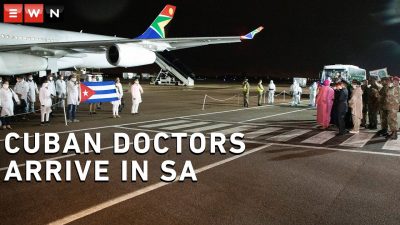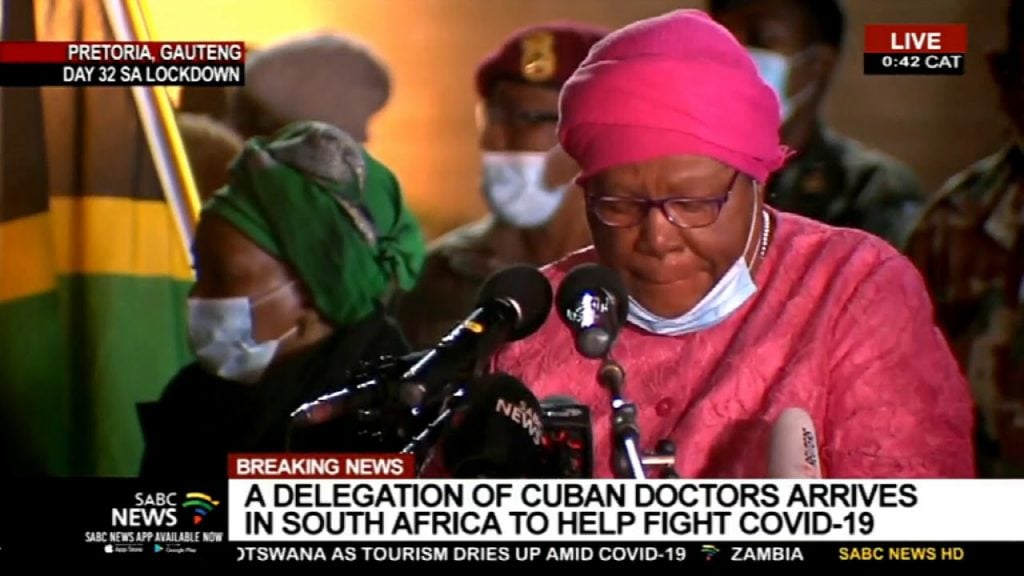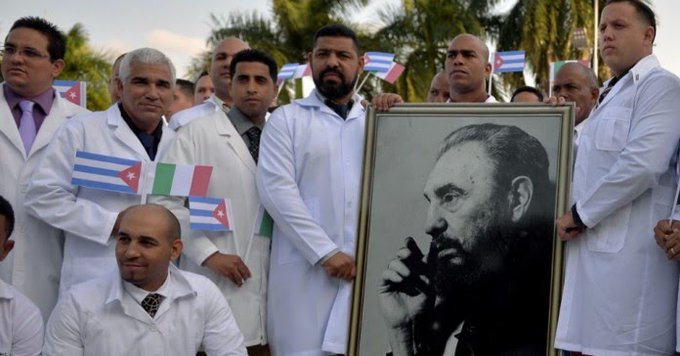Cuba Continues African Solidarity in COVID-19 Battle
Medical team arrives in South Africa as other delegations spread throughout the continent

High-ranking governmental and military leaders in the Republic of South Africa greeted a Cuban medical mission which arrived on April 27.
The 217 Cuban healthcare workers are in the country to assist in efforts to contain and eradicate the COVID-19 pandemic.
South Africa has the second largest number of cases reported on the continent only lagging behind Egypt. President Cyril Ramaphosa declared a national emergency in late March while the country remains under a five week-old lockdown.
The moments leading up to the arrival of the Henry Reeve International Medical Brigade and the welcoming ceremony held at the Waterkloof Airforce base in Pretoria were emotional for South Africa as a nation which had gained its national independence exactly 26 years earlier. Cuba had played a pivotal role in the struggle to liberate the entire region of Southern Africa from the ravages of white-minority rule and settler-colonialism.
In Angola, the Cuban Internationalists forces were deployed from 1975-1989 to support the independence of the ruling MPLA government in Luanda. Several incursions by the-then racist apartheid South African Defense Forces (SADF) during this period were repelled with the decisive aid of the Cuban military which dispatched hundreds of thousands of its volunteer soldiers over the course of 14 years.
After the defeat of the SADF in southern Angola at Cuito Cuanavale in 1988, the racist South African troops were forced to withdraw from the country paving the way for the national independence of Namibia in 1990 and later South Africa, four years later in 1994. The first African National Congress (ANC) ruling party government led by former President Nelson Mandela, expressed profound gratitude for Cuba in its contributions to South African and regional liberation as a whole.
Medicine as Socialist Foreign Policy
Decades later the Cubans had returned to engage in another battle on the medical front. The country has the healthcare personnel and socialist orientation which has been acknowledged internationally for its successful interventions in humanitarian crises.
The Cuban government’s medical personnel are a key component of the Caribbean island-nation’s foreign policy. Cuba has the highest physician-patient ratio in the world which is a direct result of the national priorities which is placed on the health and well-being of the population of 11 million people.
South African Foreign Minister Naledi Pandor welcomes Cuban medical personnel on April 27 (SABC photo)
At present the Cuban government has deployed 37,000 healthcare workers in 67 different countries in various geo-political regions of the world. These brigades are well received by various nations in Europe, Africa, Asia and Latin America. At the height of the pandemic in Italy where tens of thousands have been infected, Cuba sent a medical delegation to assist in the monumental work of the infectious disease specialists in that country.
With specific reference to the COVID-19 pandemic, Cuba as of the last week of April has deployed 1,218 medical professionals to 20 countries in Latin America and the Caribbean, Europe, Africa and the Middle East. The majority of the healthcare specialists are assigned to the most severely impacted areas to directly confront the virus. In some cases, nonetheless, there are advisory brigades which do not deal directly with patients, although they are providing consultation to local health authorities, such as in Mexico.
The Contingent which arrived in South Africa consists of epidemiologists, public health experts, general practitioners and healthcare technology engineers. These Cuban healthcare specialists are slated to assist in neighborhood screening projects which began several weeks ago. 168,000 people have been tested already. In Guateng province, 13,500 people have undergone COVID-19 tests. This province has the largest concentration of confirmed cases inside the country.
According to an article published by Granma International, the official newspaper of the Communist Party of Cuba (PCC):
“Cuban Foreign Minister Bruno Rodríguez Parrilla tweeted, ‘Without neglecting the responsibility to protect our people and despite limitations imposed by the blockade, Cuba offers modest cooperation to other peoples,’ adding, ‘In the face of the COVID-19, the priority of all must be to save lives. This is a crisis of multiple and devastating effects not only in the field of health, but also in the economy, international trade and our societies in general,’ he continued. ‘Homeland is Humanity. Under this maxim of Martí’s, our health professionals defend medical care, the welfare of the people and life in different corners of the world,’ the Foreign Minister stated. Cuba’s Minister of Public Health, José Ángel Portal, referring to the group in South Africa, said that the attitude of health professionals on these missions is based on the Revolution and our people’s principles of solidarity.”
The Cuban government has deployed medical teams to other African states in response to the COVID-19 pandemic. Those countries include Cape Verde, Togo and Angola.
Earlier in April, Togo became another country where members of the Henry Reeve International Medical Brigade have been assigned. 11 doctors are in the former French colony in West Africa to assist with the response to the COVID-19 pandemic. At the time of arrival of the Cuban healthcare workers on April 9, there were 73 confirmed cases of COVID-19 in Togo and three deaths.
Angola, where a delegation arrived on April 11, some 256 healthcare specialists including university professors, physicians and nurses have been deployed in the country’s efforts to stem the spread of COVID-19. The Cubans will conduct trainings of 1,500 Angolan medical personnel in community medicine techniques which will facilitate the necessary field work among the population.
In a statement on the Cuban mission, Angolan Health Minister Silvia Lutuca noted that:
“The training will take place at Girassol Hospital… because it has excellent simulators for practical classes, which is an indispensable condition. Angolan doctors will visit the families assigned to them, at a rate of 1,000 inhabitants per professional, cohabiting with the Cubans who arrived in Angola for this purpose. Cuban doctors will not only stay in referral hospitals. They will put their knowledge to the benefit of Angola and Angolans, even in remote areas, especially with confirmed cases.”
Socialism Promotes Cooperation in Tackling Global Challenges
Cuba has set an example of internationalism through its technical and material assistance to various states battling the COVID-19 pandemic. This foreign policy orientation can be contrasted with the starkly different approach by the U.S. administration of President Donald Trump, who has consistently stoked racism and disinformation in response to the current global healthcare crisis.
Cuban healthcare workers holding portrait of Fidel Castro
The U.S. has far more COVID-19 infections and deaths than any other country in the world. Yet the White House has continued to heighten the blockade against Cuba and intensify destabilization efforts against the Bolivarian Republic of Venezuela.
Zimbabwe, in Southern Africa, which is a close ally of Cuba, remains under U.S. sanctions despite a direct appeal by the United Nations Secretary General Antonio Guterres to end all economic and military warfare in order to place the world’s resources behind the campaign for the elimination of the pandemic. Another African Union (AU) member-state, Somalia, has been bombed on several occasions over the last few months by the Pentagon’s U.S. Africa Command (AFRICOM) in purported “anti-terrorism” operations. All of these nations in Africa and Latin America require the necessary peace to guard against the spread of COVID-19 which endangers all other peoples and nations throughout the world.
A statement issued by the Cuban Foreign Ministry on April 16 makes a significant ideological argument in favor of international cooperation during the current period. The Foreign Ministry emphasized:
“If politically motivated coercive economic measures against developing countries are not lifted and if they are not exempted from the payment of the burdensome and unpayable foreign debt and freed from the ruthless tutelage of international financial organizations, we cannot delude ourselves into thinking that we will be in a better position to respond to the economic and social disparities that, even without a pandemic, kill millions of people every year, including children, women and elders. The threat against international peace and security is real and constant attacks against some countries only made it worse.” (See this)
These sentiments represent the antithesis of imperialist foreign policy which amid such a critical conjuncture maintains its war posture. Cuban medical workers are deployed to save lives and rebuild societies.
In the city of Detroit, where the COVID-19 pandemic has killed a thousand people and sickened at least ten times more, the Moratorium NOW! Coalition is building a coalition to demand that the governor and mayor make an official request for Cuban medical assistance to the majority African American and working class municipality. While the social and economic impact of the pandemic is rendering many unemployed, homeless, food insecure, without healthcare coverage and traumatized, the intervention of socialist medical personnel from Cuba would provide the much needed material assistance as well as political morale to the masses of people.
*
Note to readers: please click the share buttons above or below. Forward this article to your email lists. Crosspost on your blog site, internet forums. etc.
Abayomi Azikiwe is the editor of Pan-African News Wire. He is a frequent contributor to Global Research.
All images in this article are from the author unless otherwise stated; featured image: Cuban doctors arrive in South Africa on the 26th anniversary of Freedom Day



